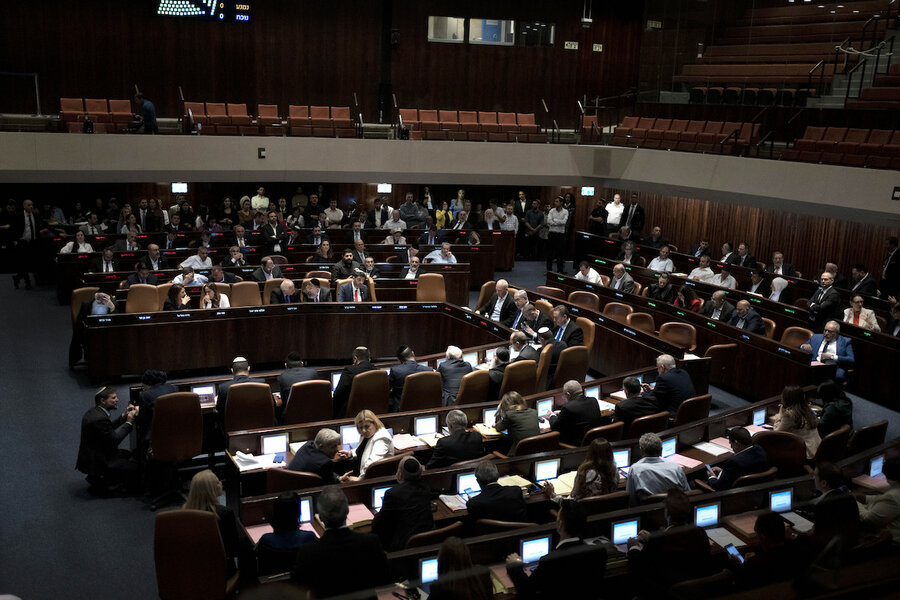Israel Supreme Court takes tough case: Ruling on its own powers
Loading...
| Jerusalem
Long feted as a torch-bearer for basic rights or scorned for elitist overreach, Israel’s Supreme Court is under ever fiercer scrutiny as it is asked to roll back Prime Minister Benjamin Netanyahu’s judicial reforms – and to rule on its own powers.
Since the Knesset, controlled by Mr. Netanyahu’s religious-nationalist coalition, passed the first bill in a stormy Monday session, a raft of appeals has been filed in the court, located a stone’s throw across a rose garden on a gentle Jerusalem hill.
For many Israelis, the two buildings might as well be worlds apart. They see in the mobilizing of the judiciary against the executive and legislature a battle for the future of a country polarized over politics, religion, ethnicity, and even gender.
“Big Bang at Supreme Court,” read a headline on the popular Ynet news site in a nod to the sense of an existential shake-up.
The court said on Wednesday it would hear arguments in September by political watchdog activists who, in their appeal, deemed the new law “a substantive change to the fundamental structure of Israeli parliamentary democracy and the character of the government.”
Proponents of the reform cried foul.
“The Supreme Court is not only being asked to be a judge in its own case, it’s being asked to decide that a constitutional amendment is unconstitutional,” said Eugene Kontorovich, a scholar at the conservative Kohelet Policy Forum in Jerusalem.
“It would truly be the end of meaningful democracy.”
Strategic Affairs Minister Ron Dermer, a top Netanyahu confidant, appeared to sidestep a question on whether the government would heed a Supreme Court decision against it.
“The government will always obey and abide by the rule of law in Israel because we’re – we have in Israel the rule of law. What we don’t have is the rule of judges,” he told CNN.
The showdown has loomed since the 1990s, when an activist chief justice, Aharon Barak, advocated expanding realms in which the court could rule in the absence of a written constitution.
It was a time of peacemaking efforts with the Palestinians that were opposed by Israelis who wanted to keep occupied land, and of military crackdowns on violence when the talks collapsed – and conservatives saw some court intervention as left-leaning.
With Mr. Netanyahu having bounded back to power in December after a decisive election win, the government has been impatient with judicial measures it perceives as undermining its mandate.
“There’s all check and no balance. That’s the problem that we’ve had in Israel over the last 30 years,” Mr. Dermer said.
Such arguments have been disputed by Alan Dershowitz, a prominent U.S. jurist with expertise in Israel’s legal system.
In a December interview, he called the Israeli judiciary “a gem ... respected all over the world” for its independence, and said that the Supreme Court's duty was being counter-majoritarian.
In Mr. Netanyahu’s Likud party, which draws core support among disadvantaged Mizrahi Jews of Middle Eastern descent, there is resentment of the mostly Ashkenazi, or European Jewish, make-up of the bench – although two of the justices are from West Bank settlements that account for just 5% of Israel’s population.
“The Supreme Court is a clique,” Dudi Amsalem, a cabinet member who holds a Justice Ministry post, argued in an April TV interview. He called for Chief Justice Esther Hayut to be put on trial for what he described as complicity in a coup attempt.
In 2022, Mr. Amsalem said in a Knesset speech that Ms. Hayut “hates” him and others from Moroccan immigrant families. She denied that in an open letter, voicing sorrow at the allegation and noting that she was born to Holocaust survivors in a transit camp.
As the crisis has gathered steam, Ms. Hayut has been assigned armed bodyguards. So has Gali Baharav Miara, Israel’s attorney-general, who has come out against the planned judicial overhaul.
Ms. Baharav Miara on Tuesday issued an opinion in favor of a separate Supreme Court appeal, due to be heard next week, against a government-led amendment to a quasi-constitutional law limiting conditions for removing the prime minister from office.
Some anti-government activists are worried about the rise of male-dominated Orthodox Jewish political parties. Mr. Amsalem did little to allay that when, addressing the Knesset last week, he accused Ms. Baharav Miara of “doing her makeup and putting rollers in her hair” rather than tackling protests against the reforms.
Merav Michaeli, head of the center-left Labour party, has praised Ms. Hayut and Ms. Baharav Miara for “protecting us [women] in the name of the law.”
This story was reported by Reuters.







